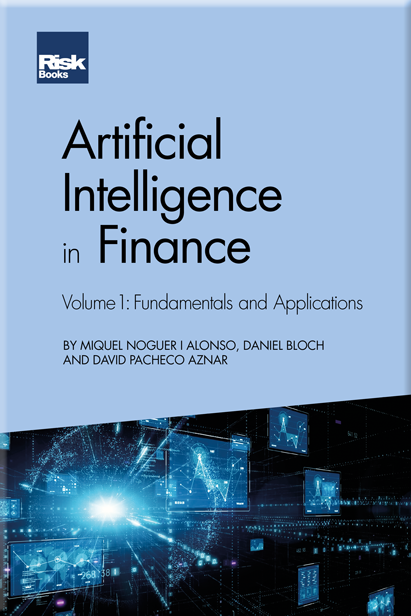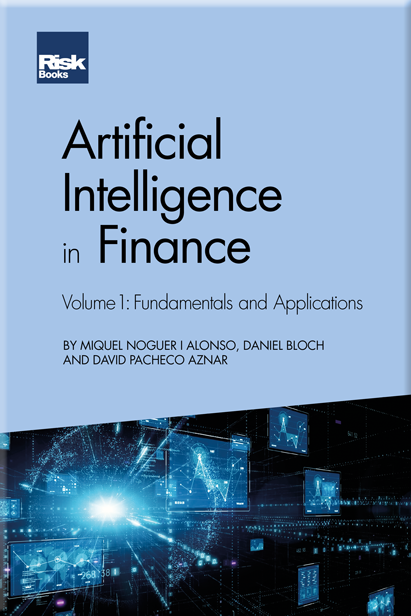Artificial Intelligence in Finance, Volume 1: Fundamentals and Applications
Artificial Intelligence in Finance, Volume 1: Fundamentals and Applications
Miquel Noguer i Alonso, Daniel Bloch and David Pac
Couldn't load pickup availability
For finance professionals and academics keen to understand the impact of artificial intelligence (AI) in their field, Artificial Intelligence in Finance, Volume 1: Fundamentals and Applications serves as a practical and extensive guide.
This book, the first in a two-volume series, aims to demystify the role of AI in finance, offering a clear and comprehensive overview that bridges the gap between complex AI concepts and their real-world financial applications.
The content is structured to build a strong foundation, starting with the basics of AI and financial engineering. It delves into key areas such as supervised and unsupervised learning, artificial neural networks, and natural language processing, presented in a manner that is accessible to both experienced finance professionals and newcomers.
The book also covers essential aspects of financial engineering, offering insights into its history, theory, and practical applications. This balanced approach ensures that readers not only gain theoretical knowledge but also understand how these concepts are applied in the finance industry.
Key features of the AI in Finance Framework are explored, including data modelling, handling of datsets, and the intricacies of feature engineering. Topics such as model performance metrics and the explainability of AI models are also addressed, providing a rounded perspective of AI's current and potential role in finance.
Serving as a lead-up to the second volume, which will focus on reinforcement learning in finance and applications of AI in Finance, this book is an ideal resource for finance professionals looking to enhance their AI knowledge and for academics aiming to enter this evolving field. Artificial Intelligence in Finance, Volume 1: Fundamentals and Applications offers a comprehensive read for anyone interested in the intersection of AI and finance.
Share

More information
About the Author
Miquel Noguer i Alonso is a seasoned financial professional and academic with over 30 years of experience in the quantitative finance industry. He is the founder of the AIFI and head of development at Global AI. His career includes the roles of executive director at UBS AG and chief information officer for Andbank. He has served on the European Investment Committee at UBS for a decade and is on the advisory board of the Financial Data Professional (FDP) Institute and the CFA Society of New York. Miquel is also an academic, teaching AI, big data and fintech at the NYU Courant Institute, NYU Tandon, Columbia University and ESADE (Spain), among others. He pioneered the first fintech and big data course at the London Business School in 2017. He is the author of 10 published papers on artificial intelligence. Miquel holds an MBA and a degree in business administration from ESADE and a PhD in quantitative finance from Universidad Nacional de Educación a Distancia (UNED), as well as professional certifications. His research interests include asset allocation, machine learning, algorithmic trading and fintech.
Daniel Bloch is the founder of Quant Finance Limited, a structuring company that focuses on statistical arbitrage on stocks, futures and options' relative value as well as derivatives pricing and risk management. He has over 20 years’ experience in modelling equity, foreign exchange and interest rates on the exotic option trading desk of various investment banks across the world. Daniel has developed bespoke solutions to solve problems for the industry using machine learning. He has an extensive background in and knowledge of applied mathematics, engineering, algorithms, physics and machine learning, applying a cross-application approach between finance and industry. He has partnered with the best research teams at École Polytechnique, Imperial College London and the University of Oxford.
David Pacheco Aznar is a computational mathematician and data scientist whose focus is on quantitative finance. He has been a quantitative analyst for an investment group in Barcelona for almost four years, as well as a quantitative researcher at the Artificial Intelligence Finance Institute (AIFI) for a year. As a quantitative analyst, he developed several back-testing strategies for various models via both classic and deep learning methods. In addition, he worked on language-model-oriented solutions to boost the predictive power of portfolio management strategies. His research output has resulted in over 1,000 Social Science Research Network (SSRN) downloads over the last year, and his papers covered generative models for time series and deep distributional reinforcement learning research and advancements in the field of portfolio management. He has been a teaching fellow at Columbia University for big data and AI and recommender systems courses. David has also been a guest speaker at New York University, where he has spoken about generative models in finance, reinforcement learning and deep reinforcement learning in portfolio management.
Table of contents
Preface
1 Introduction
2 Artificial intelligence
3 Financial engineering
4 The “AI in finance” framework
5 Supervised learning
6 Unsupervised learning
7 Artificial neural networks
8 Natural language processing
References

